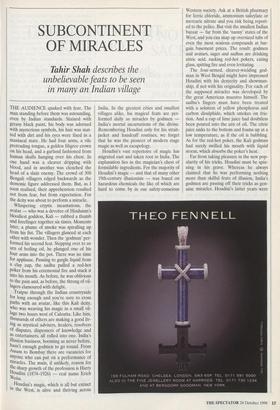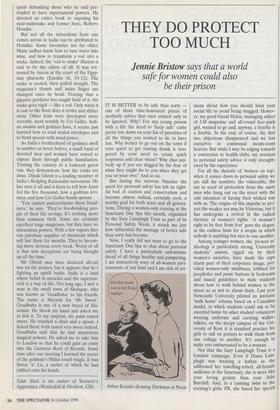SUBCONTINENT OF MIRACLES
Tahir Shah describes the
unbelievable feats to be seen in many an Indian village
THE AUDIENCE quaked with fear. The man standing before them was astounding, even by Indian standards. Stained with greasy black paint, his body was adorned with mysterious symbols, his hair was mat- ted with dirt and his eyes were fixed in a maniacal stare. He had four arms, a vile protruding tongue, a golden filigree crown on his head, and a garland fashioned from human skulls hanging over his chest. In one hand was a cleaver dripping with blood, and in another was clenched the head of a slain enemy. The crowd of 300 Bengali villagers edged backwards as the demonic figure addressed them. But, as I soon realised, their apprehension resulted not from fear, but from expectation. For the deity was about to perform a miracle.
Whispering cryptic incantations, the avatar — who was a devotee of Hinduism's bloodiest goddess, Kali — rubbed a thumb and forefinger together six times. Moments later, a plume of smoke was spiralling up from his fist. The villagers glanced at each other with wonder. Then the `godman' per- formed his second feat. Stepping over to an urn of boiling oil, he plunged one of his four arms into the pot. There was no time for applause. Pausing to gargle liquid from clay cup, the sadhu pulled a red-hot Poker from his ceremonial fire and stuck it into his mouth. As before, he was oblivious to the pain and, as before, the throng of vil- lagers clamoured with delight.
Traipse through the Indian countryside for long enough and you're sure to cross Paths with an avatar, like this Kali deity, who was weaving his magic in a small vil- lage two hours west of Calcutta. Like him, thousands of others are making a good liv- ing as mystical advisers, healers, resolvers of disputes, dispensers of knowledge and a. s entertainers, all rolled into one. India's illusion business, booming as never before, hasn't enough godmen to go round. From Assam to Bombay there are vacancies for anyone who can put on a performance of miracles. The main, if unlikely, reason for the sharp growth of the profession is Harry Houdini (1874-1926) — real name Erich Weiss.
• Houdini's magic, which is all but extinct in the West, is alive and thriving across India. In the greatest cities and smallest villages alike, his magical feats are per- formed daily as miracles by godmen — India's mortal incarnations of the divine. Remembering Houdini only for his strait- jacket and handcuff routines, we forget that he was the pioneer of modern stage magic as well as escapology.
Houdini's vast repertoire of magic has migrated east and taken root in India. The explanation lies in the magician's chest of formidable ingredients. For the majority of Houdini's magic — and that of many other 19th-century illusionists — was based on hazardous chemicals the like of which are hard to come by in our safety-conscious Western society. Ask at a British pharmacy for ferric chloride, ammonium salicylate or mercuric nitrate and you risk being report- ed to the police. But visit the smallest Indian bazaar — far from the 'nanny' states of the West, and you can snap up oversized tubs of even the most noxious compounds at bar- gain basement prices. The result: godmen and avatars, sages and sadhus are drinking nitric acid, sucking red-hot pokers, eating glass, spitting fire and even levitating.
The four-armed, cleaver-wielding god- man in West Bengal might have impressed Houdini with his dexterity and showman- ship, if not with his originality. For each of the supposed miracles was developed by the great American maestro himself. The sadhu's fingers must have been treated with a solution of yellow phosphorus and carbon disulphide, which smokes on fric- tion. And a cup of lime juice had doubtless been poured into the urn of oil. The citric juice sinks to the bottom and foams up at a low temperature, as if the oil is bubbling. As for the red-hot poker, the Kali godman had surely swilled his mouth with liquid storax, which absorbs the poker's heat.
Far from taking pleasure in the new pop- ularity of his tricks, Houdini must be spin- ning in his grave. Whereas he always claimed that he was performing nothing more than skilful feats of illusion, India's godmen are passing off their tricks as gen- uine miracles. Houdini's latter years were spent debunking those who he said pre- tended to have supernatural powers. He devoted an entire book to exposing his near-namesake and former hero, Robert- Houdin.
But not all the miraculous feats one comes across in India can be attributed to Houdini. Some favourites are far older. Many sadhus know how to turn water into wine, and how to transform a rod into a snake. Indeed, the 'rod to snake' illusion is said to be the oldest of all. It was wit- nessed by Aaron at the court of the Egyp- tian pharaohs (Exodus vii, 10-12). The snake is cooled, then pulled straight. The magician's thumb and index finger are clamped onto its head. Fearing that a gigantic predator has caught hold of it, the snake goes rigid — like a rod. Only when it is cast to the floor does it revive and slither away. Other feats were developed more recently, most notably by Uri Geller. Indi- an swamis and godmen have, it seems, just learned how to read sealed envelopes and to bend spoons with mind power.
As India's brotherhood of godmen swell in number as never before, a small band of devoted men and women have vowed to expose them through public humiliation. Touring the country in a battered green van, they demonstrate how the tricks are done. Dipak Ghosh is a leading member of India's fledgling Rationalist movement. He has seen it all and is keen to tell how Jesus fed the five thousand, how a godman levi- tates, and how Uri Geller bends spoons.
'You cannot underestimate these fraud- sters,' he says. 'They're hoodwinking peo- ple of their life savings. It's nothing more than common theft. Some are certainly excellent stage magicians, but they have no miraculous powers. With a few rupees they can purchase supplies of chemicals which will last them for months. They're becom- ing more devious every week. Worst of all is that new deceptions are being thought up all the time.'
Mr Ghosh may have declared all-out war on the avatars, but it appears that he's fighting an uphill battle. India is a land where belief in miracles and the supernat- ural is a way of life. Not long ago, I met a man in the small town of Sholapur, who was known as `Goadbaba' to his friends. The name is Marathi for 'Mr Sweet'. Goadbaba is one of a new breed of illu- sionist. He shook my hand and asked me to lick it. To my surprise, my palm tasted sweet. He touched a chair and a spoon. I licked them: both tasted very sweet indeed. Goadbaba said that he had mysterious magical powers. He asked me to take him to London so that he could gain an entry into the Guinness Book of Records. Some time after our meeting I learned the secret of the godman's Midas touch magic. It was Sweet 'n' Lo, a sachet of which he had rubbed onto his hands.
Tahir Shah is the author of Sorcerer's Apprentice (Weidenfeld & Nicolson, £20).



















































































 Previous page
Previous page